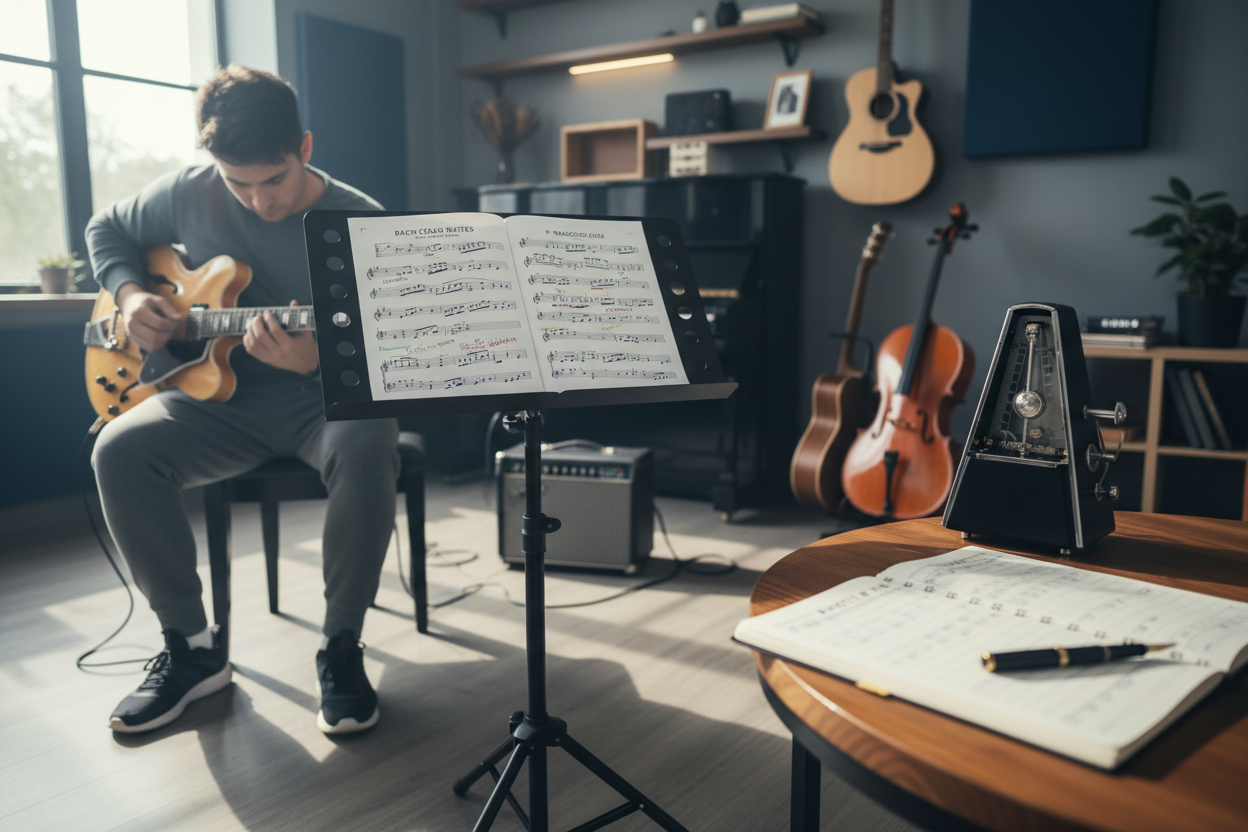Music is a powerful agent for enhancing brain health, emotional well-being, and social connection. From boosting memory and cognition through active playing to reshaping neural pathways via neuroplasticity, engaging with music offers transformative benefits across the lifespan.
The Powerful Impact of Music on Brain Health and Cognitive Function
Key Takeaways
- Playing instruments enhances memory, attention, language, and processing speed across all ages.
- Neuroplasticity is driven by musical activity, reshaping brain structures to improve motor skills and emotional control.
- Music triggers neurochemical responses—dopamine, serotonin, oxytocin, endorphins—that regulate mood, motivation, and social bonding.
- Music therapy aids recovery after brain injury by improving speech, motor function, and cognitive resilience.
- Active participation such as playing or singing provides deeper brain benefits than passive listening alone.
- Music supports language development and memory retention, making it a tool for lifelong brain health.
Table of Contents
- 1. How Playing an Instrument Boosts Cognitive Function
- 2. Music-Induced Brain Changes: Neuroplasticity in Action
- 3. Music, Neurochemicals, and Mood: How Tunes Alter Your Brain Chemistry
- 4. How Music Helps Regulate Emotions and Mood
- 5. Music Therapy and Brain Recovery After Injury
- 6. The Role of Music in Social Connection and Behavior
- 7. Passive Listening vs. Active Playing: What’s Best for Your Brain?
- 8. Music and Language: Shared Brain Networks
- 9. Memory Enhancement Through Music
- 10. The Lifelong Benefits of Music: From Prenatal to Older Adults
- Conclusion: Why Incorporating Music Into Your Life Matters
1. How Playing an Instrument Boosts Cognitive Function
Engaging in musical training activates multiple brain areas simultaneously, offering a comprehensive brain workout. Scientific research demonstrates benefits in memory, attention, decision-making, processing speed, and language skills for musicians from childhood through older adulthood.
Key cognitive benefits include:
- Stronger Memory: Enhanced working and verbal memory capacities streamline learning and recall.
- Sharper Focus and Executive Function: Consistent practice refines planning, task management, and sustained attention.
- Faster Processing Speed: Complex musical tasks improve rapid information interpretation.
- Richer Language Development: Support for articulation and new language acquisition.
It’s never too late to start. Adults learning instruments later in life experience meaningful cognitive improvements, contributing to a “cognitive reserve” that helps protect against brain aging.
Discover more about music's cognitive benefits.
2. Music-Induced Brain Changes: Neuroplasticity in Action
Neuroplasticity—the brain’s adaptability—is powerfully stimulated by musical engagement. Regular practice physically changes neural structures, enhancing communication between hemispheres and expanding essential grey and white matter.
- Thicker Corpus Callosum: Boosted interhemispheric coordination improves sensorimotor integration.
- Increased Grey and White Matter: Growth in areas controlling movement, hearing, sensation, and decision-making.
- Cortical Reorganization: Structural brain adjustments optimize the demands of musical performance.
These changes lead to better motor skills, enhanced listening, emotional regulation, and cognitive flexibility. Consistent playing, singing, or focused listening deepens these neurological benefits.
Explore how music drives neuroplasticity.
3. Music, Neurochemicals, and Mood: How Tunes Alter Your Brain Chemistry
Listening to music you love triggers the release of key neurochemicals that influence mood, motivation, social bonding, and pain relief:
- Dopamine: Generates pleasure and anticipation during enjoyable music.
- Serotonin: Enhances mood stability through calming or emotionally engaging music.
- Oxytocin: Promotes social bonding, especially in group singing or ensemble playing.
- Endorphins: Act as natural painkillers, inducing euphoria and stress reduction.
For example, group singing increases oxytocin and endorphins while lowering cortisol, fostering emotional uplift and social connection.
Learn more about music's chemical effects on mood.
4. How Music Helps Regulate Emotions and Mood
Music mirrors and influences our emotional states. The *Iso principle* in music therapy uses this by matching a person’s mood with similar music, then gradually shifting to more positive tones to support emotional regulation.
For example:
- Starting with slow, gentle music to address sadness or anxiety
- Transitioning to upbeat rhythms that encourage positivity
This technique facilitates smoother mood transitions and enhances emotional self-control, with effects proven across cultural backgrounds.
Understand more about music supporting emotional regulation.
5. Music Therapy and Brain Recovery After Injury
Music therapy is a clinically proven method to aid neurological rehabilitation for stroke, Parkinson’s disease, dementia, and other brain injuries. Benefits include:
- Improved Motor Skills: Rhythmic cues enhance coordination and walking ability.
- Speech Recovery: Melodic exercises facilitate language production and comprehension for aphasia patients.
- Neural Connectivity: Music stimulates brain networks, promoting neurogenesis and synaptic plasticity.
- Anxiety and Pain Reduction: Reduces reliance on medications through natural calming effects.
- Memory Activation: Familiar songs trigger autobiographical memories in Alzheimer’s care.
Stroke survivors often regain speech more quickly via melodic intonation therapy, making rehabilitation engaging and effective.
Explore music therapy in neurorehabilitation.
6. The Role of Music in Social Connection and Behavior
Music facilitates social bonding by releasing oxytocin and endorphins while reducing cortisol. Group activities like drumming circles or choirs strengthen trust, cooperation, and a sense of belonging.
Additionally, music influences behavior in everyday environments, enhancing communication, motivation, and productivity.
- Encourages collaboration through shared rhythms
- Supports communication between patients and caregivers
- Boosts learning and work efficiency
Discover music’s broader social influence here.
7. Passive Listening vs. Active Playing: What’s Best for Your Brain?
While both passive listening and active music-making benefit the brain, active participation—playing an instrument or singing—engages a wider neural network involving motor, sensory, executive, and language regions.
- Listening: Activates auditory and emotional centers; ideal for relaxation and mood regulation.
- Playing/Singing: Involves multi-sensory coordination and cognitive demands, yielding deeper cognitive gains.
For maximal cognitive enhancement, incorporate active music-making into your routine.
8. Music and Language: Shared Brain Networks
Music and language overlap in neural systems handling syntax, meaning, and comprehension. This explains why music training supports speech processing and verbal ability improvements.
Children engaged in music lessons develop stronger vocabulary, reading skills, and executive function; adults polish speech perception, aiding understanding in noisy environments.
Learn more about music's connection to language.
9. Memory Enhancement Through Music
Music powerfully engages the hippocampus, crucial for memory formation and retrieval. Remarkably, musical memory often remains intact even in advanced Alzheimer’s disease.
Familiar songs evoke vivid autobiographical memories, reduce agitation, and enhance orientation for dementia patients. In everyday life, rhythmic and melodic patterns aid in learning and information recall, as seen in mnemonic devices.
Explore how music supports memory recall.
10. The Lifelong Benefits of Music: From Prenatal to Older Adults
Music supports brain health at every life stage:
- Before Birth: Prenatal music exposure benefits fetal development and early maternal bonding.
- Childhood: Music education builds language, memory, and problem-solving skills foundational for learning.
- Adulthood and Beyond: Playing or listening to music maintains cognitive function, delays decline, and fosters emotional wellbeing.
Music remains a lifelong source of enrichment and resilience.
Conclusion: Why Incorporating Music Into Your Life Matters
Music is far more than entertainment—it actively shapes the brain, supports emotional balance, aids physical healing, and strengthens social bonds. By playing an instrument, singing, or joining group music activities, you engage unique neural pathways that promote overall cognitive health and well-being.
At Emusicmart, we believe that everyone benefits from a deeper connection to music. Whether starting your first guitar journey or joining a community choir, your engagement nurtures your mind and soul.
Ready to enhance your brain health? Browse our range of instruments designed to inspire and support your musical path at Emusicmart.
FAQ
Q: Is it ever too late to start learning music for cognitive benefits?
A: No! Research shows adults can improve memory and verbal skills even when starting in their 60s or later.
Q: Does passive listening to music help the brain as much as playing an instrument?
A: Both have benefits, but active playing engages more brain regions and offers deeper cognitive and neuroplastic effects.
Q: Can music really aid in stroke or brain injury recovery?
A: Yes, music therapy is validated to improve motor skills, speech, and neural recovery after injury.
Q: How does music influence emotions?
A: Music affects neurochemicals like dopamine, serotonin, and oxytocin that regulate mood, motivation, and social bonding.
Q: What is the Iso principle in music therapy?
A: It involves matching a person’s current mood with similar music and then gradually shifting to more positive music to help regulate emotions.








